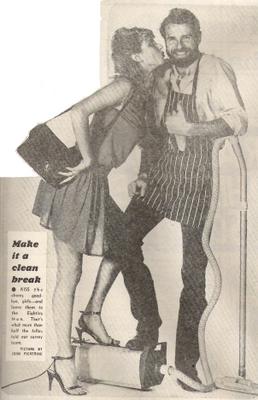 The Eighties Man: Day Two of a fascinating Sun series.
The Eighties Man: Day Two of a fascinating Sun series.FELLAS DON'T FEEL A NINNY IN A PINNY!
They'll chip in on the chores.
The Sun, January, 1983.
Today's man does not mind a bit if he is left holding the baby - in fact he quite enjoys it.
He sees nothing odd in pushing a trolley around the supermarket, running around with the vacuum cleaner, or cooking the supper.
He believes - and his wife agrees - that looking after the children and doing the household chores should be shared equally between men and women.
When it comes to getting up to feed the baby 65 per cent of men and 71 per cent of women think that, where possible, they should take turns.
Almost as many men - 62 per cent - think shopping for groceries is a task that should be shared. And more than half - 58 per cent - say that the burden of housework should be split.
Yet a decade ago a real man would not have been caught dead with a dirty nappy and would never be seen with his hands in the sink, let alone flitting around with a duster.
What has caused this major shift of attitudes?
Partly the fact that more and more women have jobs outside the home.
In our survey almost half the women - 43 per cent - worked and four per cent were the main wage earners.
Housework HAS to be shared if it is to get done at all.
But Women's Lib was, in some ways, People's Lib. Men who felt they were missing something by leaving child-care to their wives were encouraged to lend a hand.
Yet there is still some way to go before everyone rejects the old idea that a man's place is at work and a woman's place is in the home.
And the men and women who do not believe that housework and childcare should be shared equally stick to the old patterns.
Of these, 46 per cent believe that cooking the meals is woman's work.
Forty-one per cent think the same about housework and one in three say women should do the food shopping.
But 48 per cent of all men say that painting and decorating are their work and 40 per cent feel the same about gardening.
The American "Eighties Man"/"New Man" - was a similar concept, which rose into the public consciousness c. 1982, although with more emphasis on men being allowed to develop and display emotional sensitivity then is illustrated in the article above.20th Century Words by John Ayto (Oxford, 1999), traces the "New Man" to 1982 -
"a man who aims to be sensitive, caring, and non-aggressive and to take a substantial role in his household's domestic routine..."
Apparently, as the decade went on, the New Man began to be regarded as a bit of a wimp in some quarters:
1985, Chicago Tribune:
Does the New Woman really want the New Man?... The answer, as you might guess, is a frustrated no.
Sadly, the 1990s regressed, giving us the "New Lad".
I thought the 1980s were great from a male viewpoint. In my neighbourhood, back in the 70s/early 80s, boys who liked soap operas were considered... well... strange. But in the 80s, with the arrival of trendy soaps like Brookside and teenage soaps like Home and Away, it was OK for us to join in.And to get emotional.
As a kid in the '70s, I always felt as though I was in an emotional straitjacket.
Also, grooming. No man in my family ever owned a hairdryer before the 1980s. It would have been unthinkable. In 1984, I became the first!
 The "old Man" was often not very keen on the "New Man", as this comic strip from the Sun newspaper's women's section, September 15 1988, shows!
The "old Man" was often not very keen on the "New Man", as this comic strip from the Sun newspaper's women's section, September 15 1988, shows!

The 80s/New Man was based on Feminist demands of course. Men did/do the majority of outside work - including jobs, and are around 95% of workplace deaths because they do the vast amount of dangerous jobs. Feminism is female narcissism and hate - and always has been.
ReplyDeleteAbsolutely, BAZ. I must recommend Karen Straughan's excellent 'Dismantling Feminism' series on YouTube to anybody who wants an objective view of this movement. It is ugly in the extreme, and thrives via the gynocentric nature of society. An excellent starting point is Karen's article 'Feminism Was Never Not Rotten'. The fact that so many people will fling up their hands in horror at the very notion is simply proof of the pudding: https://antifeministpraxis.com/2017/03/31/feminism-was-never-not-rotten/
ReplyDelete